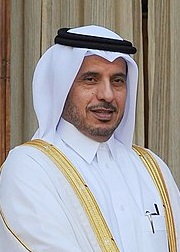Qatar sent its prime minister to a Gulf Cooperation Council (GCC) summit in Saudi Arabia on Tuesday, its highest level of representation at the annual meeting in two years and the most concrete sign yet of a possible thaw in a regional dispute.
Prime Minister Sheikh Abdullah bin Nasser Al Thani's attendance follows an intensification of efforts to resolve the row among US allies that has seen Riyadh and its partners impose a political and economic boycott against Qatar since June 2017 over allegations Doha backs terrorism. Qatar denies the charges and accuses Saudi Arabia, the United Arab Emirates, Bahrain and non-GCC member Egypt of trying to curtail its sovereignty.

Kuwait and the United States have tried to mediate the rift, which shattered the GCC alliance and undermined Washington's efforts to form a united front against Iran, which is locked in a struggle for regional supremacy with Saudi Arabia. A senior regional official told Reuters that Kuwait recently was working "extremely hard to come up with reconciliation ... supported by the United States".
Efforts to end the row, including talks between Qatar's foreign minister and Saudi officials in October, appeared to intensify after attacks in September on Saudi oil plants that initially halved the kingdom's output and heightened regional tensions.
Riyadh and Washington blame Iran for the assault as well as earlier strikes this year on tankers in Gulf waters. Tehran denies involvement. Two sources familiar with Saudi thinking said Riyadh has softened its stance on a list of 13 demands to lift the embargo, including that Doha cut links to the Muslim Brotherhood, close Al Jazeera TV, shutter a Turkish military base and reduce ties with Iran, with whom Qatar shares a giant gas field.
But little is known about the current state of negotiations, and the UAE and Egypt may still refuse to yield. "The onus lies with the one that caused the crisis, to reconsider erroneous policies that led to its isolation," senior Emirati official Anwar Gargash tweeted on Monday.
A Western diplomat said the summit could be a step forward in resolving the dispute but was unlikely to see an immediate end to it. The Qatari premier last visited Saudi Arabia in May for an emergency summit to discuss regional security following an attack on tankers in Gulf waters.









